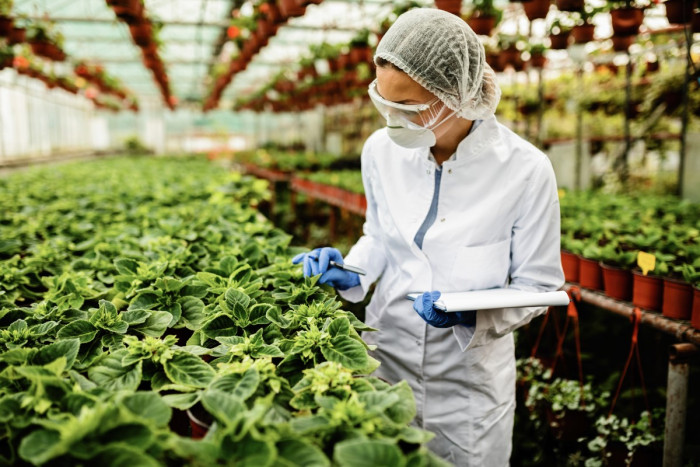Biotechnologist
Ringa Hangarau Koiora
Alternative titles for this job
Biotechnologists use their knowledge of living things to develop new animal or plant products such as medicines and pest-resistant crops.
Pay
Biotechnologists usually earn
$49K-$75K per year
Senior biotechnologists with PhDs usually earn
$76K-$130K per year
Source: BIOTech New Zealand, 2019.
Job opportunities
Pay
Pay for biotechnologists varies depending on qualifications and experience.
- Biotechnologists with Bachelor's degrees can expect to earn between minimum wage and $55,000 a year.
- Biotechnologists with Master’s degrees usually earn $55,000 to $75,000.
- Senior biotechnologists who have PhDs can earn $76,000 to $94,000.
- With more responsibility and experience, biotechnologists can earn up to $130,000 or more a year.
Source: BIOTech New Zealand, 2019.
- PAYE.net.nz website – use this calculator to convert pay and salary information
- Employment New Zealand website - information about minimum wage rates
(This information is a guide only. Find out more about the sources of our pay information)
What you will do
Biotechnologists may do some or all of the following:
- study micro-organisms such as bacteria, fungi, yeast, and their enzymes
- study the genetic make-up of plants, animals, humans and micro-organisms
- develop and test methods of making new products
- develop higher-yield or more pest-resistant crops
- meet with clients to discuss biotechnology solutions to their problems
- analyse production trends and data
- work out budget and production costs
- prepare funding or patent applications, and be part of patent discussions.
Skills and knowledge
Biotechnologists need to have:
- knowledge of biochemistry, microbiology, molecular biology and physics
- knowledge of manufacturing practices
- knowledge of how to safely handle hazardous substances
- knowledge of legal and ethical issues related to genetic engineering
- practical skills for performing experiments and operating scientific equipment
- skills in analysing and interpreting research results
- skills in writing reports and proposals
- ability to explain research to the public.
Working conditions
Biotechnologists:
- usually work regular business hours but may also work weekends and evenings to complete experiments or reports
- work in laboratories and offices at places such as plants, factories and research organisations
- may travel locally and internationally to meet with clients or attend conferences
- may work with hazardous chemicals
- may work in noisy environments.
What's the job really like?

Tanvi Karnik
Biotechnologist
Using biotechnology to help patients
The most satisfying part of Tanvi Karnik's job as a medical biotechnologist is seeing the positive impact of a treatment she’s helped develop.
“It’s exciting seeing patients with wounds they’ve had for years, like diabetic ulcers, make good progress after a few weeks.”
Focus and patience required
Using proteins from sheep intestines, Tanvi and her team make skin tissue healing products doctors can use to repair serious tissue injuries.
“My focus is on understanding the microbe populations in the wound dressings to ensure they’re at levels safe enough for use on patients.
“It means a lot of routine testing and monitoring every stage of an experiment. You keep your eyes open for the unexpected because every failed experiment is a chance to learn more.”
A chance to work at the leading edge of science and technology
An interest in the biological sciences led to Tanvi getting her Masters in biotechnology. “I chose biotechnology because I wanted to work with new techniques and reach out to a lot more people."
She says networking is key to entering the role.
"You need to find the area of biotechnology you’re most interested and connect with people in industry to get experience."
Biotechnologist video
Logan Williams talks about life as a director of technology and innovation – 1.54 mins.
In fact, I'm the director of technology and innovation for the New Zealand Merino company. We're tackling the synthetic industry with natural materials.
My generation, your generation, have been given a really bad hand of cards. We're facing some pretty serious problems that actually could threaten humanity. It's now more than ever we need scientists to lead the way. I think it's in every single one of us. It's in our culture so it's actually in our DNA as New Zealanders to come up with these amazing solutions to pretty much unforeseeable problems.
A major part of that now is taking that culture and channeling it, taking that next step, and having a broader international impact.
When I went to Canterbury University, I was surrounded by people very similar to me. I love it. I was in my element. Now I'm looking far bigger picture, like, when I come up with an invention I want to make a system and incorporate it and actually have a wider impact and I think that's where New Zealand Merino and what I'm currently doing with the wool, because we can actually go into the industry and replace plastic.
You may be sitting on your couch or in your bedroom looking at this and thinking, 'I could never be a scientist, I'm not smart enough or I can't do it', but that's outright wrong. In fact, once you learn the basics of science and the process it's actually quite simple. If you can specialise in science and be surrounded by amazing people, that's the key to success. So don't sit there and think you can't do it because you definitely can.
Entry requirements
To become a biotechnologist you need to have a Bachelor of Science, Engineering or Technology in one of the following:
- biotechnology or plant biotechnology
- biochemical engineering
- biochemistry
- food technology
- genetics
- industrial bioscience
- molecular biosciences
However, many employers prefer to hire biotechnologists with a Masters or Doctorate in biotechnology or a relevant field.
Secondary education
A tertiary entrance qualification is required to enter further training. NCEA Level 3 in calculus, biology, maths, chemistry and physics are recommended.
Personal requirements
Biotechnologists need to be:
- patient and persevering
- investigative and enquiring
- detail-oriented
- observant
- creative and innovative
- good at problem solving
- good at planning and organising.
Useful experience
Useful experience for biotechnologists includes:
- laboratory work
- research work
- quality assurance
- business management or marketing.
Physical requirements
Biotechnologists need to have good hand-eye co-ordination.
Find out more about training
- BIOTech New Zealand
- (09) 300 7559 - info@biotech.org.nz - www.biotech.org.nz
- Engineering New Zealand
- (04) 473 9444 - hello@engineeringnz.org - www.engineeringnz.org
- Institute of Environmental Science and Research Ltd (ESR)
- (04) 914 0700 - enquiries@esr.cri.nz - www.esr.cri.nz
- NZ Institute of Food Science and Technology (NZIFST)
- (06) 356 1686 - rosemary@nzifst.org.nz - www.nzifst.org.nz
What are the chances of getting a job?
Growing demand in agricultural and medical sectors
Biotechnology is a growing field, especially in the agricultural, environmental, food and medical industries.
Biotechnologists are needed to develop:
- farm animals and feed that produce lower climate-damaging methane
- animal-based veterinary vaccines
- probiotic treatments to improve animal and human gut health
- immune cell therapies for diseases such as cancer
- plants with more nutritious content such as apples with higher Vitamin C levels.
According to the Census, 102 biotechnologists worked in New Zealand in 2018.
Chances strong in university research programmes
Job opportunities have increased in university research programmes, due to the Government funding more genetics research. This includes the University of Otago's genome database project (New Zealand's first human gene bank), which will help scientists better predict disease risk and develop personalised medicines.
Chances best for those with experience
Your chances of getting a job are best if you have:
- experience working in a laboratory in industry, at a university or through a summer internship
- experience or skills in biotechnology, microbiology or genetics
- project management and business management skills.
Types of employers varied
Biotechnologists work for:
- biotechnology companies
- food production companies
- universities
- Crown research institutes
- private research institutes.
Sources
- Champion, Z, executive director, BioTech New Zealand, careers.govt.nz interview, December 2019.
- Malaghan Institute of Medical Research, ‘Government matches Malaghan Institute’s ambitions for cancer immunotherapy’, 13 June 2019, (www.malaghan.org.nz).
- Ministry of Business, Innovation and Employment, 'Scientists Occupation Outlook', 2019, (www.mbie.govt.nz).
- Morton, J, '$5m project to begin building NZ's first "gene bank"', 2 December 2019, (www.nzherald.co.nz).
- Stats NZ, '2018 Census Data', 2019.
(This information is a guide only. Find out more about the sources of our job opportunities information)
Last updated 27 March 2025


